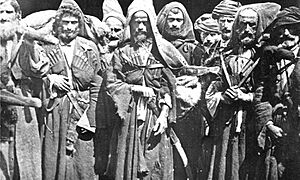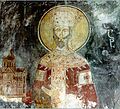Abkhazians facts for kids
| Аԥсуаа | |
|---|---|
 |
|
| Regions with significant populations | |
| Former Soviet Union | |
| 127,404 (2018 census) | |
| 11,366 (2002 census) | |
| 3,527 (2008) | |
| 1,458 (2001) | |
| 22 – 29 (2021) | |
| Diaspora | |
| 39,000 - 600,000 | |
| c. 10,000 | |
| Languages | |
| Abkhaz (native), Russian, Georgian, Turkish | |
| Religion | |
| Majority Abkhazian Orthodox Christianity (in Abkhazia) or Sunni Islam (in Turkey) with Abkhaz native faith minority | |
| Related ethnic groups | |
| Abazins, Circassians | |
The Abkhazians or Abkhazes are a group of people mainly living in Abkhazia. This area is on the northeastern coast of the Black Sea. It is a region whose status is currently debated.
Many Abkhaz people also live in other countries. A large group lives in Turkey. Their families moved there after a war in the late 1800s. Other Abkhaz people live in parts of the former Soviet Union, like Russia and Ukraine.
Contents
Who Are the Abkhaz People?
The Abkhaz people speak the Abkhaz language. This language is part of the Northwest Caucasian language family. This family also includes languages spoken by the Abazins and Circassians. The Abkhazians are closely related to the Circassians.
Abkhaz Subgroups
The Abkhaz people have three main subgroups. Each group lives in a different area and speaks its own dialect.
- The Bzyb people live near the Bzyb River. They have their own special way of speaking Abkhaz.
- The Abzhui people live near the Kodori River. Their dialect is the basis for the official Abkhaz literary language.
- The Samurzakan people live in the southeastern part of Abkhazia.
Abkhaz History
Some historians believe the ancient Heniochi tribe were the ancestors of the Abkhaz. These people met Ancient Greeks through trading posts like Dioskourias. Later, during the Roman period, people called the Abasgoi lived in the region. They were described as brave and worshipped three gods.
For a long time, the region was part of the Byzantine Empire. Later, an independent Kingdom of Abkhazia was formed. During this time, the area became part of the Georgian culture. Important people used Georgian for writing and learning. From the 11th to the 15th century, Abkhazia was part of the larger Kingdom of Georgia. After that, it became a separate Principality of Abkhazia. It was later taken over by the Ottoman Empire.
Towards the end of the 1600s, the region became a place for slave trading and piracy. The Russian Empire took control of Abkhazia between the 1810s and 1860s. This led to many Muslim Abkhaz people being forced to move to the Ottoman Empire. Russia also tried to make the Abkhaz people more like Russians. Because of this, there are now more Abkhaz people living outside Abkhazia than inside it. Most of them live in Turkey. Smaller groups live in Syria and Jordan. Some have moved to Western countries like Germany and the United States.
After the Russian Revolution of 1917, Abkhazia was part of the Democratic Republic of Georgia. But in 1921, the Red Army took control. Abkhazia then became a Soviet Socialist Republic linked to the Georgian SSR. In 1931, its status was changed to an Autonomous SSR within the Georgian SSR.
During the time of Joseph Stalin, the government forced farmers to join large collective farms. Many local leaders were also removed. People from Armenia, Russia, and Georgia were encouraged to move to Abkhazia. They worked in farming and tourism. Abkhaz schools were even closed for a short time. By 1989, Abkhaz people made up about 18% of the population. Georgians were 45%, Armenians 15%, and Russians 14%.
The war in Abkhazia from 1992 to 1993 was a very difficult time. After the war, many Georgians had to leave their homes. This meant that Abkhaz people became the largest group in Abkhazia, making up about 45% of the population. Other groups included Russians, Armenians, and Greeks. In 2003, about 94,606 Abkhaz people lived in Abkhazia. By 2011, this number grew to 122,175, making up 50.8% of the total population.
In recent years, some Abkhaz people living in Syria have moved back to Abkhazia. This happened because of the conflict in Syria. By 2013, over 500 Abkhaz people had returned from Syria. The Abkhazian government has said it will continue to help Abkhaz people living abroad to return.
Abkhaz Economy
The Abkhaz people traditionally have an economy based on farming. They are good at raising cattle and keeping bees. They also grow grapes for wine and other crops.
Abkhaz Religion
The Abkhaz people mainly follow two religions. Most Abkhaz people in Abkhazia are Orthodox Christians. In Turkey, most Abkhaz people are Sunni Muslims. However, some Abkhaz also follow their traditional native beliefs.
Christianity first came to the region around the 1st century AD. It became the main religion for Abkhazians in the 6th century. Islam was introduced in the 16th century by the Ottoman Empire. Over time, many people in the region became Muslim.
Abkhaz Diaspora
Many Muslim Circassians, Abkhaz, and Chechens moved to the Ottoman Empire. This happened after they revolted against Russian rule. It is believed that more Abkhaz people live in Turkey than in Abkhazia itself. There are an estimated 250 Abkhaz-Abaza villages across Turkey. Some estimates say that between 600,000 and 800,000 people of Abkhaz descent live in Turkey today. However, only a smaller number still speak the Abkhaz language.
Abkhaz Genetics
Genetically, the Abkhaz people are most similar to the Abazins and Circassians. There are also some genetic similarities with certain Western Georgian groups.
Images for kids
-
Bagrat III of Georgia, an 11th-century king
Notable People
Literature
- Alexey Gogua (born 1932), writer
- Dmitry Gulia (1874–1960), Abkhazian Soviet writer and poet
- Fazil Iskander (1929–2016), writer
- Bagrat Shinkuba (1917–2004), writer, poet
Politics
- Aslan Bzhania (born 1963), Abkhaz politician
- Alexander Ankvab (born 1952), Abkhaz politician
- Anzor Kudba (born 1939), member of the Supreme Council of the Republic of Georgia
- Gennadi Gagulia (1948–2018), Abkhazian politician
- Hayreddin Pasha (1820–1890), Ottoman politician
- Mirab Kishmaria (born 1961), Abkhaz politician and army general
- Nestor Lakoba (1893–1936), Abkhaz communist leader
- Rauf Orbay (1881–1964), Turkish politician, naval officer and diplomat
- Raul Khajimba (born 1958), Abkhazian politician
- Shaaban Abash (1890–1943), rider in the Circassian cavalry regiment during WWI
- Sergei Bagapsh (1949–2011), President of Abkhazia
- Vladimir Arshba (1959–2018), Abkhaz soldier and politician
- Vladislav Ardzinba (1945–2010), first de facto president of Abkhazia
Other
- Mikhail, Prince of Abkhazia (died 1866)
- Hala Gorani, American journalist
See also
- Afro-Abkhazians
- Women in Abkhazia
- History of Abkhazia
- Abkhaz language
 | Percy Lavon Julian |
 | Katherine Johnson |
 | George Washington Carver |
 | Annie Easley |








